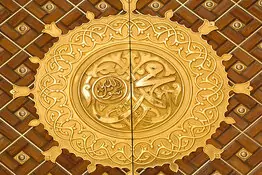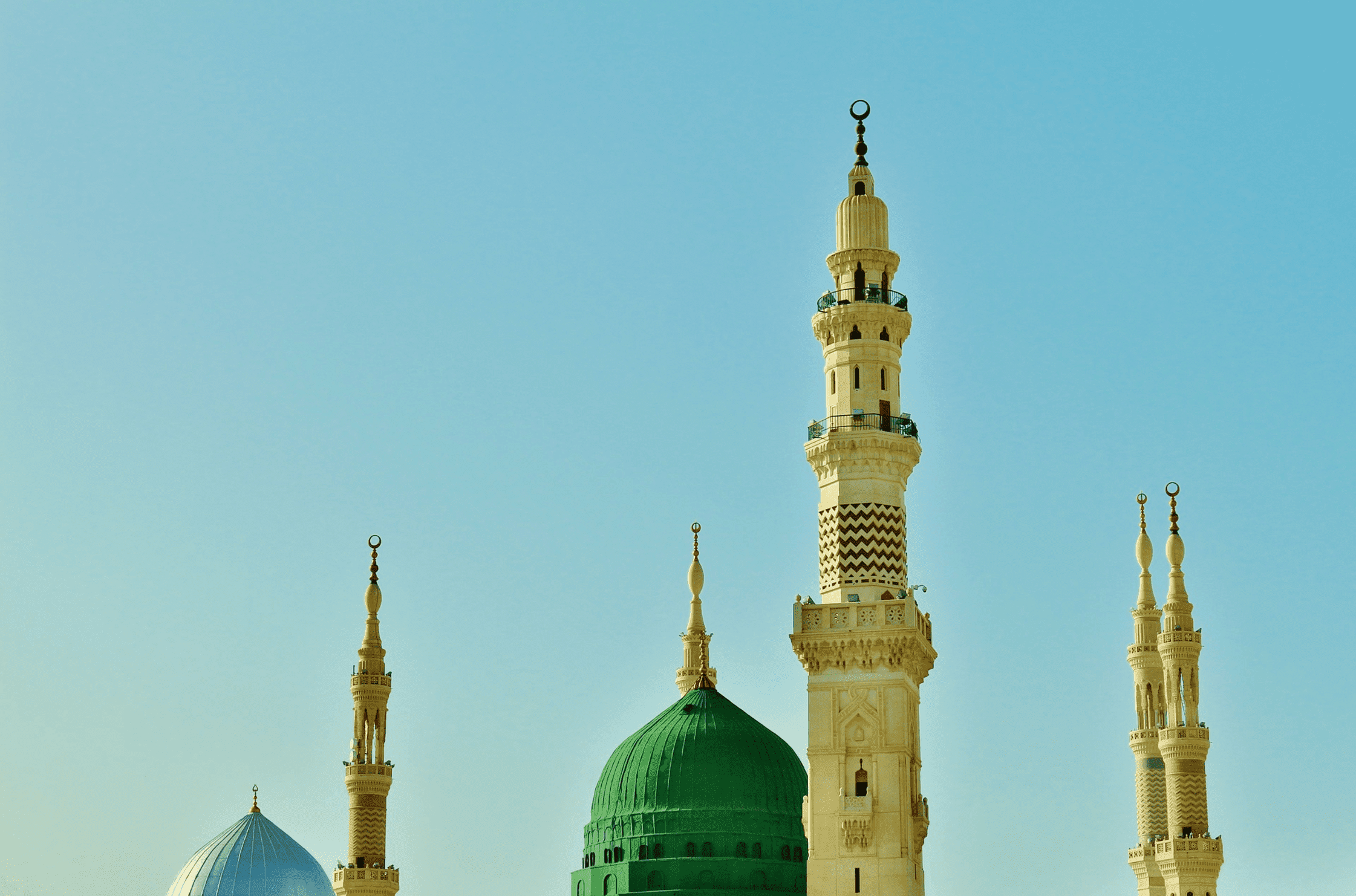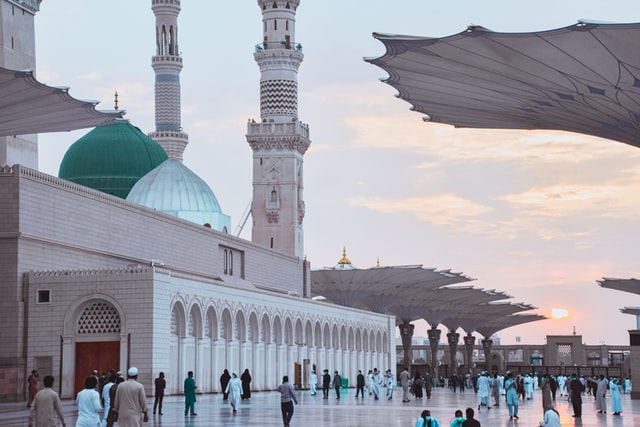His arrival heralded a new dawn for the whole universe after a long dark night: The noblest of Allah’s creation, the leader of His creation, and the Seal of His Messengers.
None from Allah’s servants are equal to him. He won hearts through his character. He captivated souls through his love. And He made mankind cry out of yearning for him. He is Muḥammad b. ʿAbdillāh: Allah’s final and most beloved Messenger, sent as a mercy to mankind till the Last Day.
He was the best of the best. His worship was the best. His character and interactions with others were the best. His family relations were the best. His leadership was the best.
His Iman & Love for Allah
He ﷺ was the most God-fearing, obedient and humble servant of Allah. None knew Allah like he ﷺ did. His īmān and yaqīn in Allah was unshakeable. His sincerity, his hope and trust in Allah never wavered. His worship, dhikr, and duʿā’ were legendary. In the Night Journey, he ascended where no other – not even Jibrīl – had the privilege to ascend, witnessing some of the marvels of his Lord.
In this journey, he was gifted with ṣalāh: his source of deep joy. Nothing pleased him more than intimate conversation with Allah, his Beloved. His recitation was beautiful. He would stand throughout the night, reciting, bowing and prostrating for so long that his companion, who once joined him, thought of leaving the prayer. And yet, from his compassion, when he ﷺ would hear the crying of the infant in congregational prayer, he would shorten the prayer.
He revolutionised society. He lifted the people out of darkness and showed them the truth, the light of īmān. He personified servitude. He breathed gratitude. He was shy, not just of creation, but from his Lord. He loved Allah, and Allah loved him.
His Sublime Character
“And you are truly (a man) of outstanding character” (68:4).
His character was exemplary. He epitomised kindness, compassion and love. He was genuine and selfless. He was honest and trustworthy, a man of principle and integrity. He was gentle yet strong. He was modest yet confident and dignified. He was wise in his words and actions, and he epitomised balance.
There was an aura around him. If you saw him from far, you would be in awe of him. Once you got to know him, you would fall in love with him.
He ﷺ would never degrade or abuse people. He wasn’t foul-mouthed. He would not engage in useless chatter, let alone backbite or gossip. He didn’t shout, nor scream. He spoke little, and when he would speak, he captured hearts. He was a magnificent orator. He would turn fully to the person he was addressing, and he would give them his full attention. He forgave easily, and when he got angry it was only for Allah. His anger was composed and harnessed to achieve a higher objective. He would not hold grudges, and did not like to hear negative things about others. “Let no one convey to me anything (negative) regarding one of my companions, for I love to meet you with a pure heart,” he ﷺ said.
His emotional intelligence was complete. Everyone loved to be in his company. He valued every individual, to the extent that he made every single person feel like they were the most beloved to him. He removed people’s insecurities and replaced it with confidence. Zāhir (raḍiy Allāhu ʿanhu) was a Bedouin companion who was unattractive, and of low social status. He ﷺ once hugged him from behind so Zāhir (raḍiy Allāhu ʿanhu) couldn’t see who it was. Realising that it was the Messenger of Allāh, Zāhir leaned in and pressed his back to the chest of the Prophet, in order to obtain the barakah (blessings) of the Prophet. He ﷺ jokingly began to cry out, “Who will purchase this slave from me?” When Zāhir (raḍiy Allāhu ʿanhu) said that he was of little value, the Prophet ﷺ replied, “But in the sight of Allah, you are precious!”
He was selfless and always helped those in need. He was a pillar for the oppressed and the downtrodden. He championed the rights of women, children, orphans, the poor and slaves. He was sensitive to the pain and hunger of others. He was the torchbearer of justice. He laid down piety as the criterion of superiority, not colour, lineage, or wealth.
His humility was unsurpassed. He was the best of men, and yet there was no one humbler than him. He would not allow his companions to stand for him, or to walk behind him. A young slave girl made him walk with her around Madinah, and he happily obliged to fulfil her needs. He would milk the goat, patch his clothes and help with the housework. He would accept gifts, but then always give something back in return. He did not criticise food. If he didn’t like it, he would leave it.
He lived a simple life. He owned very little of the world, and yet he was the most generous. He would never hoard, and he would give everything away. “Accept Islam, for Muḥammad gives like a man who does not fear poverty,” a Bedouin would tell his tribesmen. This is despite the fact that he frequently suffered hunger and poverty.
He ﷺ said, “I suffered fear in the path of Allah as no one else has, and I suffered harm in the path of Allah as no one else has! Thirty consecutive days and nights would pass and there would be no food – suitable for any living being – for me and Bilāl to eat, except that which would be concealed in the armpit of Bilāl.” And yet, he turned down Allah’s offer of making the valley of Makkah into gold for him and chose the humble life of a servant-Prophet.
His heart was attached to his Lord, not to this world. Once, ʿUmar (raḍiy Allāhu ʿanhu) went to see him ﷺ and saw marks on his blessed back due to the bed he was sleeping on, which was made from leather and stuffed with palm fibre. He began to cry and compared the basic furnishings of the Prophet ﷺ with the worldly riches the Emperors of Rome and Persia were enjoying. The Prophet ﷺ told him, “For them is this world and for us is the Hereafter!”
He was the bravest of men. He fought and led many battles. When the battles would get fierce, his companions would seek shelter with him; and he ﷺ would be the closest one to the enemy lines. Once there was a loud noise which awoke the inhabitants of Madinah, who feared the city may be under attack. By the time the companions went out to check, they found the Prophet ﷺ had beat them to it. He returned, bareback on a horse, with his sword hanging around his neck and told them not to fear anything.
The Messenger: A Grateful Servant
He suffered immense difficulties throughout his life, yet he always smiled. As a young child, he never met his father. At the tender age of six, he lost his mother, and soon after, his grandfather. When he was chosen to be Allah’s Messenger, his own people turned against him. He was defamed, mocked, strangled, and stoned. He witnessed his own companions being tortured. He lost his beloved Khadījah and staunch supporter, Abū Tālib, within the space of a year. Eventually, he was forced to leave his beloved birthplace.
His beloved companions were slain in battle. In Uḥud, his beloved uncle Ḥamzah was killed and then mutilated. He ﷺ himself was wounded. Till the end of his life, enemies lurked outside and within. Plots were hatched to kill him. He was poisoned. Heinous accusations were made against his beloved wife, ʿĀ’ishah.
He buried six of his seven children in his lifetime.
Yet, none of this made him bitter. Instead, he was the most empathetic, sensitive, and humble of all men. He remained steadfast and didn’t waver from the mission entrusted to him by the Lord of the worlds. Instead of complaining “Why me?” he would worship his Beloved throughout the night. When reminded of being already forgiven by Allah, he remarked: “Should I not be a grateful servant?”
The Messenger: The Murabbi
There was no one more loving and kinder to children than him. This testimony was from none other than Anas b. Mālik who served him for ten years from when he was a young boy. Throughout this time, he would recall, the Prophet ﷺ never cursed him, nor spoke to him harshly, nor asked him “Why did you do so and so?” nor “Why didn’t you do so-and-so?” Many years later, he would say, “Not a single night passes except that I see my beloved ﷺ in my dream.” Anas would say this and then cry. He would say, “I hope I will get to meet him ﷺ on the Day of Judgement – I will say to him: “O Messenger of Allah, your little servant!”
He would ask children about their interests and concerns, and console them for their losses. He would initiate salām when he would pass by them playing. He honoured them and made beautiful du‘ā’s for them in their presence.
He was the best teacher. He was sent as a raḥmah (mercy) for the world, an ocean of love and compassion. Once, a Bedouin urinated in the masjid. The Companions began to scold him, but the Prophet ﷺ instructed them to leave him and let him finish urinating. When he finished, he ﷺ kindly explained to the Bedouin that this was not appropriate for the masjid. The Bedouin said, “The Prophet neither cursed, scolded or hit me”.
He won the hearts of his Companions, young and old. He brought out the best in everybody. He recognised their potential, maximised the unique talents of his Companions, and did not expect them all to be carbon copies of each other. He nurtured their īmān, their worship, and their character.
He raised a whole generation of young ṣaḥābah. He developed their confidence, entrusting them with tasks usually reserved for the elderly, paving their way to raise the banner of lā ilāha illa Allah in lands far beyond Madinah.
The Messenger: A Family Man
He ﷺ was a loving father, an easy-going husband, and a doting grandfather. Despite his many commitments, he always gave quality time to his family. He would engage them in both light-hearted and meaningful conversations. He would send his army forward so he could race his beloved wife, ʿĀ’ishah. His devoted time with her made her into one of the greatest scholars of this Ummah.
His loyalty to Khadījah years after her death was astounding. Tears flowed from his blessed eyes when he saw the necklace his daughter had sent to free her husband (who had been taken a prisoner in Badr), as it had belonged to Khadījah.
He would stand for his beloved daughter Fāṭimah when she would enter, welcome her and kiss her forehead. And she would do the same for him.
He would kiss and hug his grandchildren. He would let them ride on his shoulders and sit on his back whilst he prostrated. He once prolonged a sajdah – unusually – and when asked why he did this, he said, “My son (i.e., one of his grandsons) climbed on my back, and I disliked hurrying him, so he could fulfil his wish.”
Loved By Allah’s Creation
He was held in high esteem by the creation of Allah. Rocks would greet him, the food around him would be heard glorifying Allah, and even a tree cried at his departure! He ﷺ used to deliver his Jumuʿah sermon by leaning on a palm tree, until a pulpit was made for him. “When Jumuʿah came, he proceeded towards the pulpit, and the palm tree began to wail like a child. The Messenger ﷺ descended from the pulpit and embraced the tree, which carried on moaning like a child who is being comforted. He ﷺ said, ‘It was crying because it missed hearing the remembrance of Allah near it.’” (Bukhārī)
When al-Ḥasan al-Basrī used to narrate this hadīth, he would cry. Then he would say, “O servants of Allah, a piece of wood missed the Messenger of Allah ﷺ because of his status with Allah; You should be more eager to meet him!”
Even the animals knew who to turn to when in distress. Once, a camel wept to him and complained to him about its hunger and fatigue. He ﷺ patted its head, so the camel stopped weeping. He ﷺ then reprimanded its owner for mistreating the camel.
The Messenger & His Love for The Ummah
He would always smile, and yet, he was constantly worrying and sad for his ummah. His Ummah was everything. Me and you. He loved us and cried for us.
On one occasion he ﷺ lifted his hands and while weeping, invoked, “O Allah! My ummah, my ummah!” Allah sent Jibrīl (‘alayhis-salām) down with the glad tidings: “Muhammad, surely we will please you in regards to your ummah and we will not cause you grief.” In every ṣalāh, he ﷺ would make duʿā’ for us, and ask Allah to forgive us.
He made immense sacrifices so that lā ilāha illa Allāh would reach us today. He ﷺ missed us and yearned to see us. He ﷺ once said, “I wish to see my brothers!” The companions (radiy Allāhu ʿanhum) asked him, “O Messenger of Allah, are we not your brothers?” He ﷺ replied, “You are my companions, but my brothers are those who have not yet come in the world. I will welcome them at the hawd (blessed fountain).” Unlike the other messengers who had their exclusive duʿā’ accepted in this world, he ﷺ reserved his duʿā’ for us on the Day of Judgement where he will intercede on our behalf.
Ṣall Allāhu ʿalayhi wa sallam.
Do We Truly Love Our Prophet ﷺ?
Sometimes we claim to love the Prophet ﷺ, but our actions speak otherwise. Loving him ﷺ entails obeying him, honouring him, and embodying his Sunnah in every aspect of our lives. Loving him ﷺ means he is always in your thoughts, always in your conscience: his words mould your actions, his life shapes your life.
He ﷺ has left the world, but he left us the Qur’ān – which he embodied – and his Sunnah. Let us cling on to them and carry forward his legacy. Let us remember him and invoke abundant ṣalawāt upon him, for each time we invoke ṣalawāt upon him, he responds to us. Even though we were not blessed to meet him in this world, we still have an opportunity to attain his duʿā’.
O Allah, make our love for Your beloved ﷺ genuine. Let our love for him translate to obeying him. Let his sunnah illuminate our hearts, lives, homes and the entire world. Grant us his intercession, make us drink from his blessed hands at the ḥawḍ, and unite us with him in al-Firdaws.
How Can We Increase in Our Love for the Prophet ﷺ?
1. Read and study his sīrah. The more you know someone, the more you love them.
2. Send abundant ṣalawāt, with reflection on its meaning, and on the life of the Prophet ﷺ.
3. Embody his sunnah in your life and witness the blessings in every aspect of your life.






